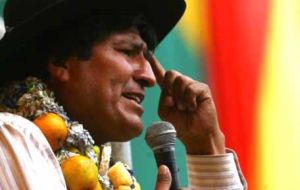MercoPress. South Atlantic News Agency
A fractured Bolivia heading at full speed to the cliffs
 Morales described the strike as a ”rich people's strike
Morales described the strike as a ”rich people's strike Opposition leaders in Bolivia have promised a fresh wave of protests and “civil disobedience” against a new draft constitution. Their call follows a strike on Wednesday that closed banks, schools and public transport in six of Bolivia's richest provinces.
The opposition argues that the proposed constitutional changes will give the government too much power. President Evo Morales says the reforms will finally give indigenous and poor Bolivians a say in running the country. The strike was relatively peaceful and attracted the strongest support in the gas and farm rich province of Santa Cruz - an opposition stronghold. The local Santa Cruz leader, Branko Marinkovic, announced an indefinite hunger strike starting on Monday. Marinkovic also urged the provinces to lobby international organizations against what he described as a "breakdown in democracy". However there was less support for the strike in the central city of Cochabamba and the Bolivian government described the protest as a failure. In the capital La Paz Morales condemned the strikers during a massive rally. "The strike... is against this process of change, the new economic model, against the nationalization of natural resources". "At heart, it's about defending the neo-liberal model that has done so much harm to the country", he added. Morales described the strike as a "rich people's strike, of people who are against equality and fairness. They lack moral and ethical values: they call for democracy and organize civil disobedience, they talk of unity and call for independence". One key sticking point in the constitutional changes is the designation of Bolivia's capital. Sucre has seen weeks of unrest by protesters supporting opposition plans to make the city the sole capital of Bolivia. Five people were killed and hundreds injured over the weekend, prompting appeals for calm from the US and the United Nations. Sucre is currently home to the Supreme Court, and was Bolivia's capital until 1899, but since then it has shared the title with La Paz. Opposition anger has been escalating by the way the government has pushed its reforms through the assembly elected to write the new constitution. On Saturday, the opposition boycotted a meeting of the Constituent Assembly which voted through the draft constitution under military guard. Former president and leader of the main opposition group Podemos, Jorge Quiroga has called for the Catholic Church's mediation in the conflict fearing that Bolivia with a long history of instability and violence could be entering a new similar chapter at full speed. In spite of the strong resistance in six provinces where support for Morales has plummeted over 30 points in the remaining three, mostly indigenous, the president can count with a 90% backing, according to public opinion polls which could ensure him a 50% vote in the referendum to confirm the constitution's reforms. No date has yet been announced for the referendum




Top Comments
Disclaimer & comment rulesCommenting for this story is now closed.
If you have a Facebook account, become a fan and comment on our Facebook Page!